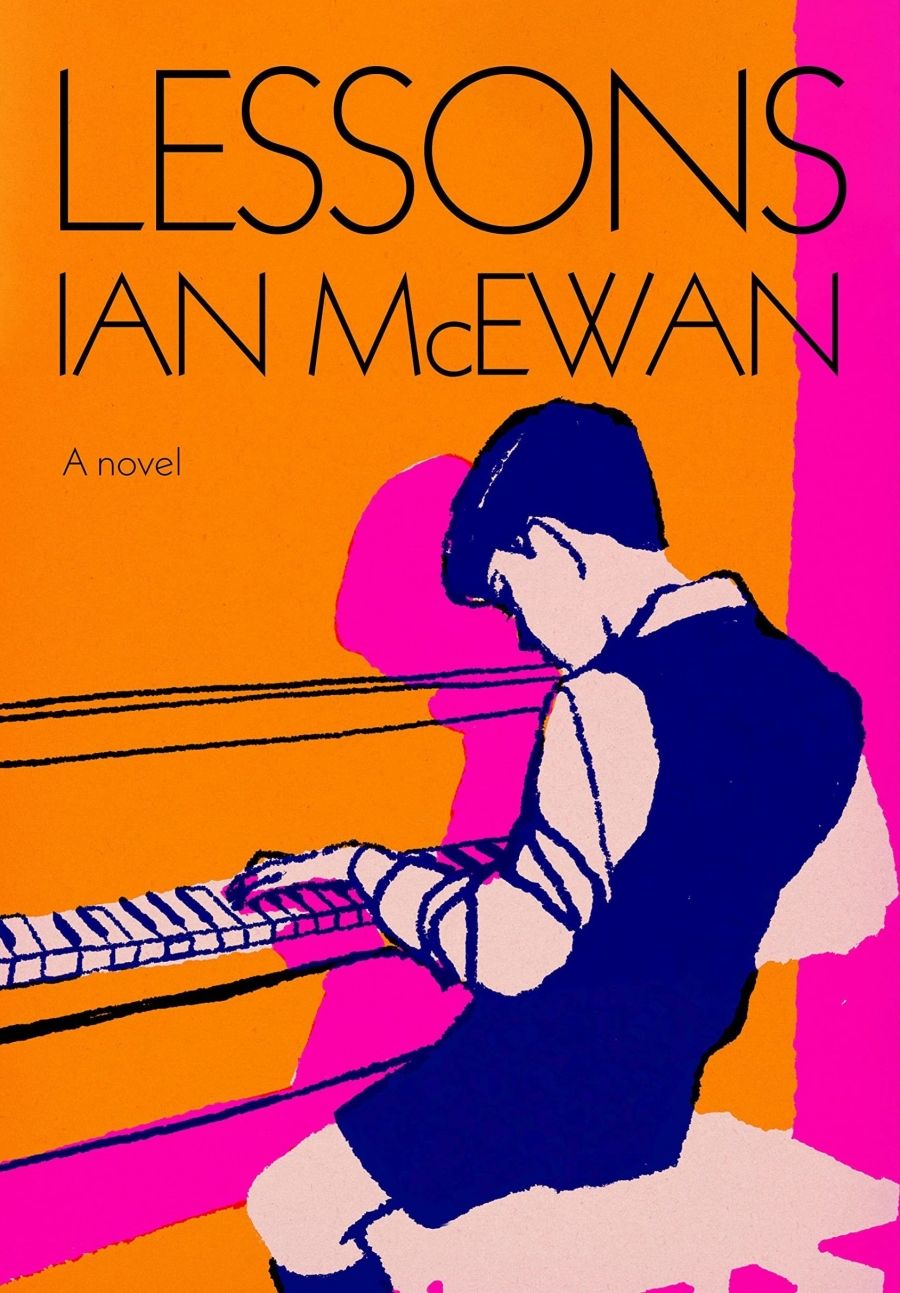
- Free Article: No
- Contents Category: Fiction
- Review Article: Yes
- Article Title: Years of doldrum
- Article Subtitle: Ian McEwan’s chordal new novel
- Online Only: Yes
- Custom Highlight Text:
John Updike said of his most enduring creation, Harry ‘Rabbit’ Angstrom, that he was a version of the author who never went to college. Roland Baine, protagonist of Lessons, is something similar: a McEwan that failed. He’s a man whose early gifts aren’t brought to fruition. His closest brush with literary fame is brief: early marriage to a woman who becomes the kind of artist he could never be. Roland does not possess the requisite ruthless ambition; he lacks the splinter of ice in the heart. He’s a sensualist by inclination and passive by nature – a born helpmeet and second stringer who cobbles together a working life as a lounge-bar pianist and part-time tennis instructor.
- Article Hero Image (920px wide):

- Article Hero Image Caption: Ian McEwan (Horst Friedrichs/Alamy)
- Book 1 Title: Lessons
- Book 1 Biblio: Jonathan Cape $32.99 hb, 496 pp
- Book 1 Readings Link: booktopia.kh4ffx.net/5brWrj
Roland is different: he’s rendered porous by his flaws. The long history of the United Kingdom and Europe in the postwar era and early twenty-first century explored by Lessons (a period which, not coincidentally, tracks McEwan’s life) would bounce off those characters who come encased in the solipsism and certitude that can accompany worldly success. Instead we see those years of doldrum, punctuated by convulsive event – periods during which the structures of feeling that shape society buckle and shift – seep into Roland’s bones.
Roland, then, is less an active human agent than an accumulation of geological strata laid down over time: a man who can stand for the mediocre many. From a core sample of his life, we might, as with Updike’s Rabbit, deduce a ‘report on the state of [the] hero and his nation’.
If the existence rendered in these pages is remarkable mostly for its ordinariness, the novelistic structure containing it is anything but. Lessons’ sole epigraph comes from Finnegans Wake. Readers soon sense the strenuous efforts made by the author to honour James Joyce’s circular sense of history, that riverine progress which ultimately returns us to our point of origin.
Roland Baine’s origins closely accord with those of McEwan: early years in Libya where his working-class Scottish father was stationed, a meticulous, rule-bound Captain with the British army; then a return to England and boarding school in his early teens. Where biography and imagination part company lies in the author’s account of an affair, beginning when Roland is just fourteen, with a female piano teacher a dozen years older than him.
Roland is a gifted young pianist, Miriam Cornell an attractive, tightly wound woman whose gender has thwarted greater achievement as a musician. Spotting something in her student, she is both jealous and attracted; she doesn’t know whether to punish or coddle him. The result is a sentimental education straight out of Flaubert – or would be, if this were not an Ian McEwan novel. The author instead paints a picture of a predatory, sadistic, and perhaps deranged woman seeking to entrap an innocent and live vampirically through his talent.
Lessons, then, is a word whose sense shifts from the plainly instructive to the ominously punitive as the chapters pass. These ‘lessons’, hours of passion stolen from schooldays at Miriam’s village cottage, at first feel like a premature coming into manhood for Roland. Only later can we see them as the baseline trauma of his life. The affair and its abrupt conclusion retard his emerging talent as a musician, and they waken in him an addiction to physical passion which will deform his life in years to come.
McEwan uses the full breadth of the keyboard in giving account of these childhood events. The novel opens in early middle life, at the moment when Roland’s first wife, half-German Alissa, abandons him and their infant son, Lawrence. It returns to those early lessons intermittently as the years pass and Roland ages along with the century.
The novel’s chronological structure is almost chordal. Harmony links Roland’s present with his past. This is not so much Proust’s involuntary memory – accidental recall evoked by a madeleine dipped in tea or uneven cobblestones – but a series of echoes that live on in the sound world of the here and now, as well as pointing towards the future.
If these virtuosic runs back and forth in time elevate Lessons over the usual state-of-the-nation novel, McEwan’s urge to editorialise remains. The book’s weakest moments occur when Roland is shoved by his creator into proximity with grand events of the era. By chance, for example, he finds himself in the city hours after the fall of the Berlin Wall – and there, among the milling crowds, happens across the wife who abandoned him and their son years before. Such coincidence allows McEwan to opine on the significance of the moment – that triumphal false dawn at the End of History – but it’s one he over-employs. Roland turns up, Zelig-like, at too many other hinge moments. As a schoolboy, his boarding house is adjacent to a US base that is a potential nuclear target during the Bay of Pigs invasion. Much later in life, he marries a woman whose former husband becomes a minister in the Brexit-era Tory government – a screaming caricature of neoliberal hooliganism. The list goes on.
Stronger are moments resolutely private and domestic in scope: for example, the awful interlude after Roland’s wife Alissa leaves Roland and Lawrence, claiming in a farewell note that her talent as a writer is threatened by family life. That Alissa fulfils her promise and becomes a giant of European literature – an Ingeborg Bachmann-like scourge of the established order who eventually succumbs to alcoholism – only drives the point home.
McEwan also allows surprising tenderness in his depiction of family relations, albeit with a sharp eye for the fractures and torsions that nuclear families exhibit. If Roland’s drifting existence is shaped, in part, by reaction to his father’s constricted life, McEwan allows moments of connection between the two to supersede generational differences. Here the author offers forgiveness rather than instruction.
As the decades pass and Roland feels the inevitable intimations of mortality, the chordal structure of Lessons achieves its fullest effects. ‘What a strange thing to happen to a little boy,’ said then-elderly poet George Oppen, referring to the surprise of ageing. McEwan’s approach means we see how closely boy and older man are connected. They almost co-exist in these pages, playing a four-hander across the decades on the piano in Miriam’s sitting room.
The formal patterning and historical scope of Lessons are impressive. McEwan’s ability to tie Western modernity’s politics, society, culture over time and across space to a single human life lends a subjective focus and emotional anchor to the project. But where Joyce was unabashed in his use of all the stages of human history – Giambattista Vico’s triad of the divine, the heroic, and the human – McEwan seems trapped in the last phase alone. He’s too much the atheist, the rationalist, the intellectual child of Bentham and Mill to entertain truly radical possibilities. He regards politics the same way Philip Larkin regards death: with implacable narrowness.
Lessons reminds us that an essential feature of McEwan’s fiction over time has been the toggle between dark unreason and sunny rationality. So it is that the nightmares depicted in his works have mostly been placed between brackets, either as stand-alone short stories or novellas embedded in longer works. Darkness must not be allowed to contaminate the whole.
For all the effort and talent brought to bear in these pages – the capacious, ironic intelligence synthesising historical material of seven decades and more – McEwan reiterates here a kind of superb, technocratic third-way-ism: a stubborn belief in the secular magic of capitalism with a human face – in progress as ineluctable law.
‘History,’ thought Joyce’s Stephen Dedalus, ‘was a tale like any other too often heard.’ What Joyce knew, and what McEwan does not, is that even the most brilliant exposition of long-entrenched ideological positions ultimately leaves readers cold. We must trust, instead, that the artist can remake the world with her art, not just paint the deckchairs and arrange them more efficiently.


Comments powered by CComment